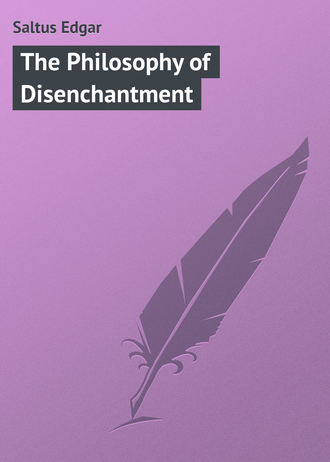 полная версия
полная версияThe Philosophy of Disenchantment
It was the melancholy privilege of the writer to assist, a short time since, at an operation performed in a German hospital. A common soldier had been thrown from a horse with such force that his elbow was dislocated; in the Klinik he put his uninjured arm around a post, and then let the surgeon pull on a strap which had been fastened to the other, until the joint was once more in position. His arm was then bandaged, and he was told to return in a fortnight. On his second visit the bandage was removed, and the surgeon, after a violent effort, moved the stiffened joint backwards and forwards. During both operations, the only noticeable evidence of pain was a slight contraction of the upper lip, while the general expression of his face was that of a calm as stolid as is required of the soldier when in the presence of his superior. To such an one as he life is no more an affliction than it is to the turtle.
Then, there are those to whom life is the amusing dream of an hour, who flit through existence in loops of yellow light, who find pleasure in all things, and are careless of the morrow; and these, perhaps, above all others, are the most to be envied. It is such natures as theirs that are usually met with in ordinary fiction, and which are so singularly infrequent in real life. In fancy they are evoked with ease, and yet somehow they do not seem to bear the stamp which experience has set upon the real. That there are such natures it is, of course, absurd to deny, but to affirm that they are persistent types is scarcely in accordance with facts. There are, for instance, many young people who enter life with a prodigality of supposition which is certainly lavish; they see that others are smiling, and that life, even to its outskirts, presents an appearance of pleasing serenity. The supposition which they foster, that a percentage of happiness will be allotted to them, is then not unreasonable; on the contrary, it is very natural; but as far as the expectation goes, we are, most of us, very well aware that it holds its own but for a short space of time.
This fact, while self-evident, is not always satisfactorily explained; indeed, the reason why so many become disappointed with life is, perhaps, explainable only on psychological grounds. By all means the most important rôle throughout the entire length and breadth of humanity is that which is played by thought. Its influence is as noticeable in a bakeshop as in the overthrow of an empire; yet, in spite of the results which are constantly springing from it, it was Rousseau's opinion that "l'homme qui pense est un animal dépravé." Balzac caught at this theme, and wrung from it its most severe deductions. To him it was a dissolvent of greater or less activity, according to the nature of the individual in whom it worked. Others have considered it to be the corrosive acid of existence, and the mainspring of every misfortune; all this it may or may not be, but that at least it is the prime factor of disenchantment is evidenced by such an every-day instance as that man, as a rule, and with but few exceptions, pictures in advance the pleasures and sensations which the future seems to hold, and yet when the pictured future becomes the actual present the disproportion between fact and fancy is so great that it results, in nine cases out of ten, in a complete insolvency. After one or more bankruptcies of this description the individual very generally finds that he has had enough, so to speak, and lets hope ever after alone, whereupon disillusionment steps in and takes its place.
It is thought, then, that does the mischief; or to be more exact, it is the inability to maintain an equilibrium between the real and the ideal; that is, in the majority of cases, the cause of disenchantment. To this it may be also added that it is because every one is so well organized for misfortune that such a small amount of open revolt is encountered. When it does appear, it is, as a rule, presented by such thinkers as have been mentioned in the course of these pages, who, through their assertion of the undeniable awake the dislike and animosity of those who have not yet had their fill of proceedings in bankruptcy, and still hope to find life a pleasant thing well worth the living.
It may be said in conclusion, and without any attempt at the discursive, that the moral atmosphere of the present century is charged with three distinct disturbances, – the waning of religious belief, the insatiable demand for intense sensations, and the increasing number of those who live uncompanied, and walk abroad in solitude. That each of these three effects is due to one and the self-same cause is well-nigh unquestionable. The immense nausea that is spreading through all lands and literature is at work on the simple faith, the contented lives, and joyous good-fellowship of earlier days, and in its results it brings with it the signs and portents of a forthcoming though undetermined upheaval. Jean Paul said that we care for life, not because it is beautiful, but because we should care for it; whence follows the oft repeated yet hollow reasoning, – since we love life it must be beautiful; and it is from a series of deductions not dissimilar that the majority of those who are as yet unaffected by that which after all may be but a passing change still cling resolutely to the possibility of earthly happiness.
Out of a hundred intelligent Anglo-Saxons there are seldom two who think precisely alike on any given subject, be that subject what it may, – art, politics, literature, or religion. Indeed, there is but one faith common to all, and that is custom. It is not, however, customary to discuss a subject such as that which is treated in these pages; and it is, as a rule, considered just as bad form to question the value of life as it is to touch upon matters of an indelicate or repulsive nature.
It is, perhaps, for this latter reason, as also in view of the great difference of expressed opinion on all topics, that in England, and especially in America, so little is said on this subject, which for many years past has been of interest to the rest of the thinking world, and which each year is gaining in strength and significance. What its final solution will be is, of course, uncertain. Schopenhauer recommended absolute chastity as the means to the great goal, and Hartmann has vaguely suggested a universal denial of the will to live; more recently, M. Renan has hazarded the supposition that in the advance of science some one might discover a force capable of blowing the planet to atoms, and which, if successfully handled, would, of course, annihilate pain. But these ideas, however practicable or impracticable they may be in the future, are for the moment merely theories; the world is not yet ripe for a supreme quietus, and in the mean time the worth of life may still be questioned.
The question, then, as to whether life is valuable, valueless, or an affliction can, with regard to the individual, be answered only after a consideration of the different circumstances attendant on each particular case; but, broadly speaking, and disregarding its necessary exceptions, life may be said to be always valuable to the obtuse, often valueless to the sensitive; while to him who commiserates with all mankind, and sympathizes with everything that is, life never appears otherwise than as an immense and terrible affliction.
1
Zeller, Philosophie der Griechen.
2
Werke, v. p. 408, et seq.
3
Briefe über die Schopenhauer'sche Philosophie.
4
"Yes, yes, Sarastro reigns herein." – Air from the Magic Flute.
5
An article in the Revue des Deux Mondes.
6
Hegel et Schopenhauer. Paris: Hachette et Cie.
7
Arthur Schopenhauer. Von ihm, Ueber ihn. Berlin.
8
This distinction of Kant's is not strictly original. Its germ is in Plato, and Voltaire set all Europe laughing at Maupertuis, who had vaguely stated that "nous vivons dans un monde ou rien de ce que nous apercevons ne ressemble à ce que nous apercevons." Whether Kant was acquainted or not with Maupertuis' theory is, of course, difficult to say; at any rate, he resurrected the doctrine, and presented idealism for the first time in a logical form.
9
"Das Fundament der Moral," contained in Die beiden Grundprobleme der Ethik. Leipsic: Brockhaus.
10
Zur Philosophie der Geschichte, u. s. w. Carl Duncker, Berlin; also Das Tragische als Weltgesetz, u. s. w. Lauenburg.
11
An admirable translation (the work of Professor Charles Carroll, of New York) of this romance appeared a few years ago in Harper's Monthly.









